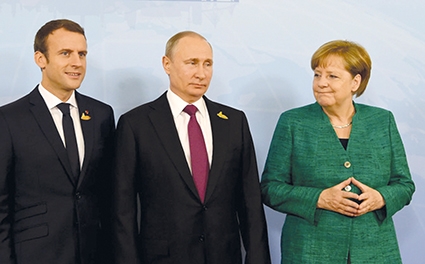Possible EU-Russia Rapprochement
OP-Ed
Confrontation between Russia and the European Union (EU) caused by the Ukrainian crisis is long-lasting, but there seem to be avenues of opportunities from time to time for Moscow to weaken the EU/US resolve.
In the last couple of years, internal economic difficulties along with the rise of anti-EU parties within the continent’s important countries, including France, Germany and Italy, have made it possible for Russia drive a wedge among the European powers to have the anti-Russian sanctions lifted. Russia has also tried to leverage the Europeans with its influence in Syria to gain advantages in Ukraine. Those schemes largely failed when in 2016-2017 the Dutch, French and German elections mainstream parties and pro-Europeans won.
However, it was clear at the time that the internal crisis in the EU was not over, but only postponed. Indeed, there are signs nowadays that the disagreements are back in the Eurozone and Russia will have good opportunities to use them.
First is the increasing willingness on behalf of major European politicians to increase cooperation with Moscow. For example, the French President Emmanuel Macron recently visited Russia where he signed large investment projects with the Russian President. Macron’s visit comes after another European leader, German Chancellor Angela Merkel, visited the President Vladimir Putin in the Black Sea resort Sochi on May 18.
Calls across the EU to lift the anti-Russian sanctions are being heard again and the Europeans are experiencing deep problems with their trans-Atlantic partners. US President Donald Trump signed steep aluminium and steel tariffs on its closest trade partners, among them the EU.
This comes atop disagreements between Washington and the EU over the US withdrawal from the landmark Iran Nuclear Agreement reached in 2015 and the White House’s opposition to the Russia-EU gas project ‘North Stream 2.’
In 2016-2017, Moscow did not enjoy such an opportunity to divide the western allies, as the Europeans and the Americans shared pretty much untarnished relations on grand strategic issues.
Dangers to the western unity are there, but it is still unclear what will come out of these US-EU economic and diplomatic confrontations. True that for Moscow it will be a big opportunity to use, but the maximum the Russian leadership can hope for is the (partial) lifting of EU sanctions as well as minor concessions regarding militarization of eastern Europe. Yet, even if this happens, from a broader perspective, the EU will still remain a winner in a competition with Russia, as Ukraine remains firmly under the European economic influence.
The EU-US disagreements are important, but not so much as to cause real fractures in the trans-Atlantic partnership (at least for the moment). Both allies understand they need each other to keep on top of the Russian pressure. Europe understands that without the US’ military resolve in eastern Europe, Ukraine’s military capabilities are unlikely to improve, making Moscow less hesitant in its actions on its borderlands.
This is not to deny that Macron and Merkel’s relations with Putin are not important, but they should rather be seen in the context of the immediate tactical needs. It is also correct not to isolate Russia entirely, as the country is an important player in European security. On a grand scale though, Germany and France are unlikely to abandon Ukraine or Georgia. The return of these countries into the Russian orbit would amount to a real resurgence of the Russian power across the Eurasian landmass.
As such, although there are real possibilities for Moscow to encourage differences between Europe and the US, it is too early to claim that fundamental changes in the geopolitical landscape are coming. Tactical rapprochements should not be misinterpreted as strategic changes.
By Emil Avdaliani












